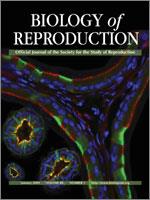The eutopic endometrium in women with endometriosis demonstrates diminished endometrial receptivity and altered gene expression. It is unknown if the endometrium being defective gives rise to a predisposition toward endometriosis and infertility or, alternatively, if endometriosis causes the altered endometrial receptivity. Here we created experimental endometriosis in mice and examined the expression of several markers of endometrial receptivity in the eutopic endometrium. Methylation of Hoxa10 was also evaluated as a potential mechanism responsible for altered gene expression. Expression of each gene was measured using quantitative real-time RT-PCR at 14 wk after induction of endometriosis. Expression of Hoxa10 and Hoxa11, which are necessary for endometrial receptivity, were decreased in the endometriosis group. Insulin-like growth factor binding protein-1 (Igfbp1) mRNA was decreased in the endometriosis group. However, there was no change in Integrin beta3 (Itgb3) mRNA expression. Total progesterone receptor (Pgr-AB) was increased in the endometriosis group and the ratio of Pgr-B to Pgr-AB was increased, indicating a shift from Pgr-A to Pgr-B expression. Basic transcription element-binding protein-1 (Bteb1), official symbol and name Klf9, Kruppel-like factor 9, which functionally interacts with Pgr in endometrium, was also decreased in the endometriosis group. In addition, hypermethylation of Hoxa10 in the endometriosis group was shown by methylation-specific PCR and confirmed by bisulfite sequencing. These findings demonstrate that normal endometrium, when placed in an ectopic location to create experimental endometriosis, led to characteristic changes in gene expression in eutopic endometrium. These data suggest the existence of a signal conduction pathway from endometriosis that alters endometrial gene expression through altered Pgr signaling and epigenetic programming.
How to translate text using browser tools
1 January 2009
Experimental Murine Endometriosis Induces DNA Methylation and Altered Gene Expression in Eutopic Endometrium
Banghyun Lee,
Hongling Du,
Hugh S. Taylor
ACCESS THE FULL ARTICLE

Biology of Reproduction
Vol. 80 • No. 1
January 2009
Vol. 80 • No. 1
January 2009
endometriosis
female reproductive tract
gene regulation
Hoxa10
Hoxa11
implantation
Methylation




